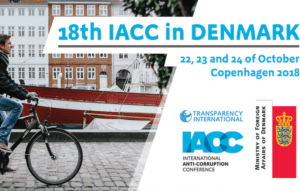News
Denmark to host big anti-corruption conference
This article is more than 8 years old.
Least corrupt country in the world spearheading new high-level segment at next year’s Anti-Corruption Conference (IACC)

Pedalling hard in the face of corruption (photo: IACC)
The government has announced it will host the Anti-Corruption Conference (IACC) in Copenhagen next year aimed at strengthening international co-operation in tackling corruption within development work.
The development minster, Ulla Tørnæs, said at the UN General Assembly in New York yesterday that ministers from over 20 nations will be invited to the conference held from October 22-24 in 2018.
“Corruption is often a significant barrier in development work, so it’s important that we step up our efforts against corruption on a high political level,” said Tørnæs.
“My ambition with the conference is to engage a number of central players regarding specific initiatives in a bid to overcome corruption to the benefit of the world’s most impoverished. This will also prevent development funds ending up in the wrong pockets.”
READ MORE: DI: Avoiding corruption in Russia is difficult, but can be done
High-level segment
The IACC has been held since 1983 where representatives from the public sector, civil society, media and private sector congregate to discuss the global anti-corruption agenda.
Next year, under Denmark’s stewardship, the conference will include a high-level segment involving ministers from donor countries, developing nations and representatives from a number of multilateral organisations such as the UNDP, UNODC, OECD, World Bank, African Development Bank and Asian Development Bank.
The following nations will be invited to the high-level segment next year: Argentina, Afghanistan, Burkina Faso, Colombia, Canada, France, Finland, Georgia, China, Nigeria, the Netherlands, Norway, Sri Lanka, Tunisia, the UK, Germany, Tanzania, Singapore, Sweden, Ukraine and the US.
Fighting corruption is a key priority for the Danish government’s foreign policy and humanitarian strategy, and the IACC is expected to attract over 1,000 participants from across the globe.
It would seem quite appropriate for Denmark to host the conference, considering the nation is regularly ranked as the least corrupt country in the world.






































